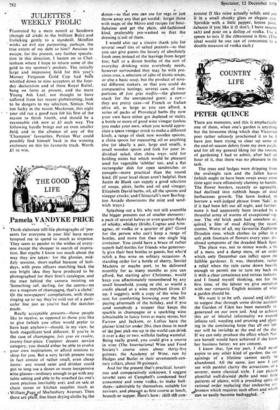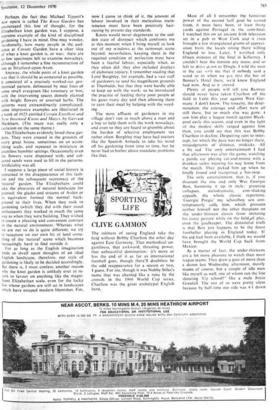COUNTRY . LIFE PETER QUINCE
There are moments, and this is emphatically one of them, when one's garden is anything but the lovesome thing which that Victorian poet rather odiously proclaimed it to be. I have just been trying to clear up some of the end-of-season debris from my own patch. and for all my general liking for the routine of gardening I had to admit, after half an hour of it, that there was no pleasure in the task.
The trees and hedges were dripping from the overnight rain and the ,fallen leaves " (which ought to have been swept away some time ago) were offensively clammy to handle. The flower borders, recently so agreeable, had declined into rubbish heaps of dead herbaceous growth. The lawn looked, to borrow a well-judged phrase from 'Saki'. as if it had been left out all night, and further- more it had apparently been invaded by a thrustful army of worms of exceptional vig- our. The old brick path had somehow ac-. qtlireit'a • film • of mud ddring:the recent . storms. Worst of all, my. favourite Zephirine Drouhin rose, which clothes its pillar in a soft pink fountain of flowers every year. dis- closed symptoms of the dreaded Black Spot.
The place was, not to mince words, a hit of a mess, and a damp mess, of an order which only December can inflict upon the fallible gardener. It was, therefore, 'rather a relief when the rain came down heavily enough to permit me to turn my back on it with a clear conscience and retreat indoors; and I found .myself thinking, not for the first time, of the labour we give ourselves with our romantic English notions of what a garden should be.
We want it to be soft, casual and idyllic: to suggest that through some divine accident the Garden of Eden has been naturally re- generated on our own soil. And to achieve this air of blissful informality we expend infinite toil, weeding and pruning and plant- ing in the continuing hope that all our lab- our will be invisible at the end of the day. If we can only produce the effect which Nat- ure herself would have achieved if she knew her business better, we are content.
I know that, for; my' part, I shall never aspire• to any other kind of garden; the im- aginings of a lifetime cannot easily be abandoned. All the same, just now I can see with painful clarity the attractions of a severer, more classical style. I can picture plentiful well-drained paths- and neat little patterns of plants, with a presiding• spirit of • rational order replacing that endearing art- idessness which requires such effort and which can so easily become bedraggled. Perhaps the fact that Michael Tippett's new opera is called The Knot Garden has
encouraged this line of thought, for the Elizabethan knot garden was, I suppose, a supreme example of the kind of disciplined gardening I have in mind. One may wonder,
incidentally, how many people in the aud- ience at Covent Garden. have a clear idea
of what a knot garden is, or was: there are so few specimens left to examine nowadays, although 1 remember a fine reconstruction of one at Stratford-upon-Avon.
Anyway, the whole point of a knot garden was that it should be as unnatural as possible. It consisted of a precisely worked-out geo- metrical pattern, delineated by neat lines of some small evergreen like rosemary or box, with the intervening spaces densely planted with bright flowers or assorted herbs. The patterns were extraordinarily complicated; some impressive examples are illustrated in a work of 1623 entitled Certain Excellent and New Invented Knots and Mazes, by Gervase Markham. (The maze was really only a variation on the same theme.)
The Elizabethans evidently loved these gar- dens. They were created in the grounds of every great house, sometimes on an aston- ishing scale, and repeated in miniature in countless humbler settings. Occasionally even the flowers were dispensed with, and col- oured sands were used to fill in the patterns. Artificiality was all.
I suppose a large piece of social history is contained in the disappearance of this fash- ion and the subsequent supremacy of the 'natural' garden. The Elizabethans could take the pleasures of natural landscape for granted; the glades and streams of Arden or its equivalent formed the normal back- ground to their lives. When they took to gardening (which they did with their usual enthusiasm) they worked in much the same way as when they were building. They wished to create a pleasing and convenient contrast to the natural environment: Whereas what we are out to do is quite different; we try to recapture on our own bit of land some- thing of the 'natural' scene which becomes increasingly hard to find outside it.
For as long as the English imagination tends to dwell upon thoughts of an ideal English landscape, therefore, our style of gardening is likely to be decided accordingly. But there is, I must confess, another reason why the knot garden is unlikely ever to re- turn to favour on anything like the magni- ficent Elizabethan scale, even for the lucky few whose gardens are still set in landscapes which have escaped modern blemishes. For, now I come to think of it, the amount of labour involved in their meticulous main- tenance must have been positively hair- raising by present-day standards.
Knots would never degenerate to the sod- den state of disrepair which confronts me at this moment when I bring myself to look out of my windows at the rainswept scene beyond; nevertheless, keeping them. in the required condition of perfection must have been a fearful labour, especially when, as they often did, they also included displays of elaborate topiary. I remember reading that Lord Burghley, for example, had a vast staff of gardeners to tend his magnificent grounds at Theobalds, but that they were hardly able to keep up with the work; so he introduced the practice of feeding thirty poor people at his gates every day and then allowing them to earn their meal by helping with the weed- ing.
The most affluent of gardeners in my village don't run to much above a man and a boy to help them with the work nowadays, and even so they are heard to grumble about the burden of selective employment tax rather often. Burghley may have had matters like the Spanish Armada to take his mind off his gardening from time to time, but he never had to bother about mundane problems like that.











































 Previous page
Previous page